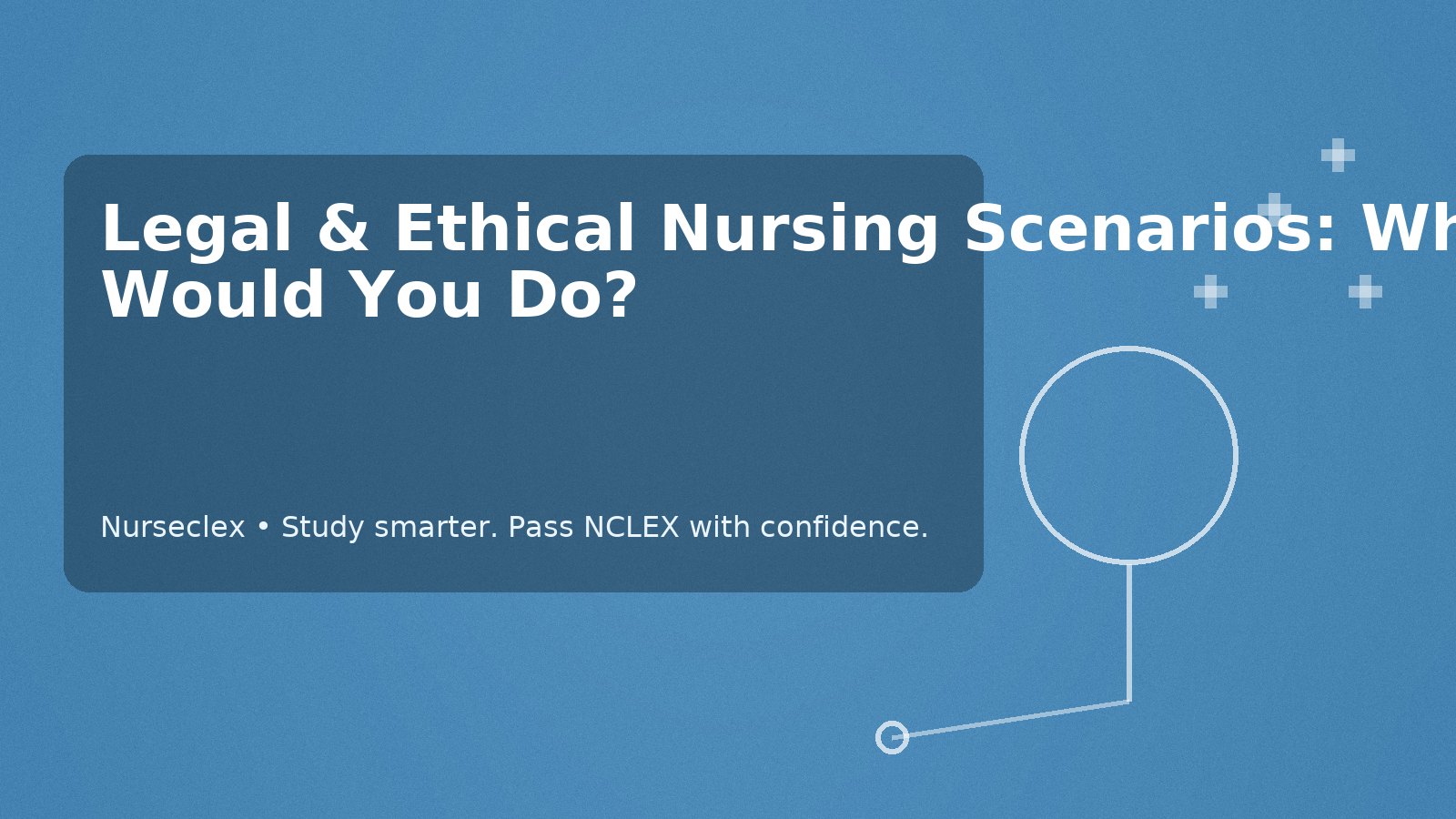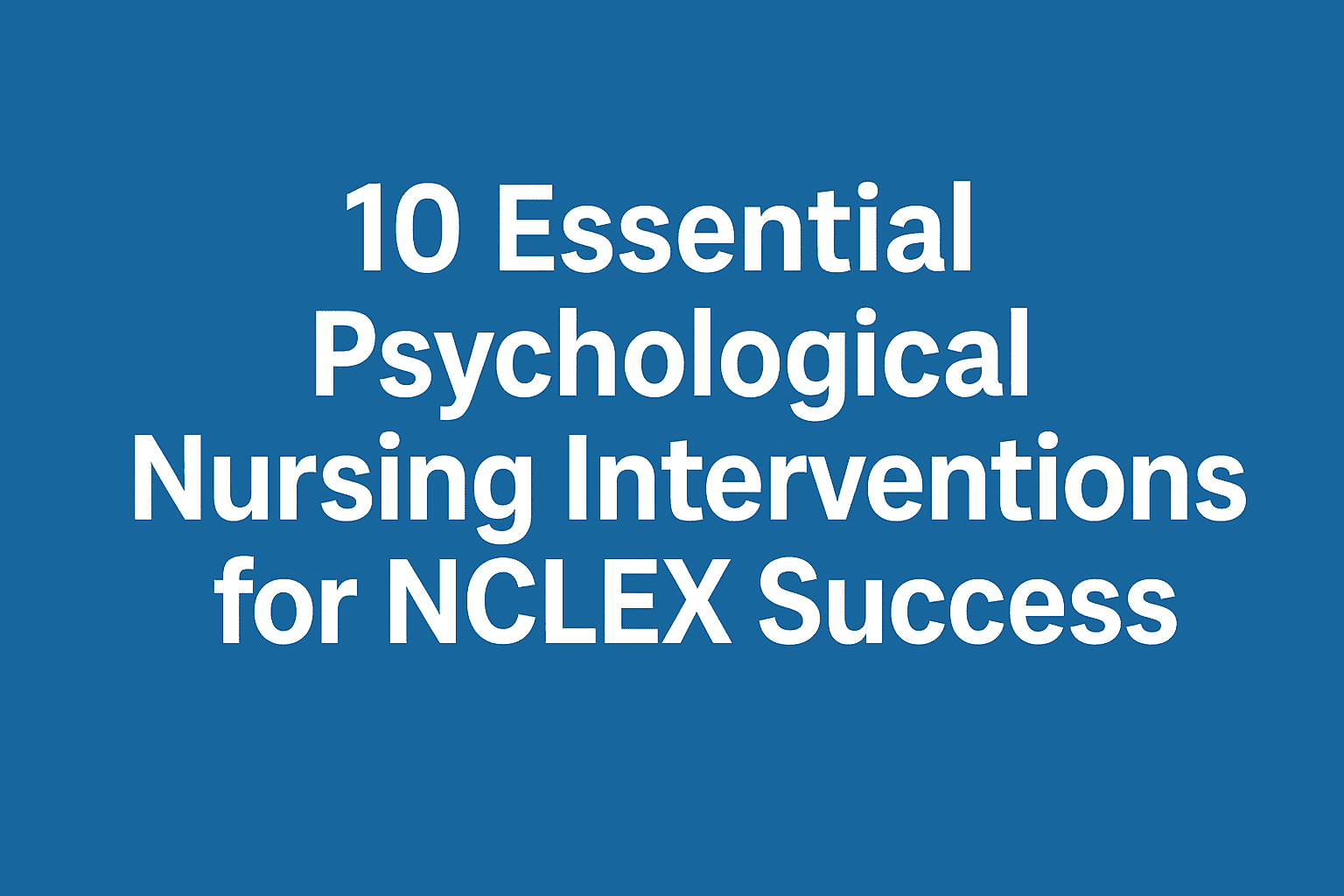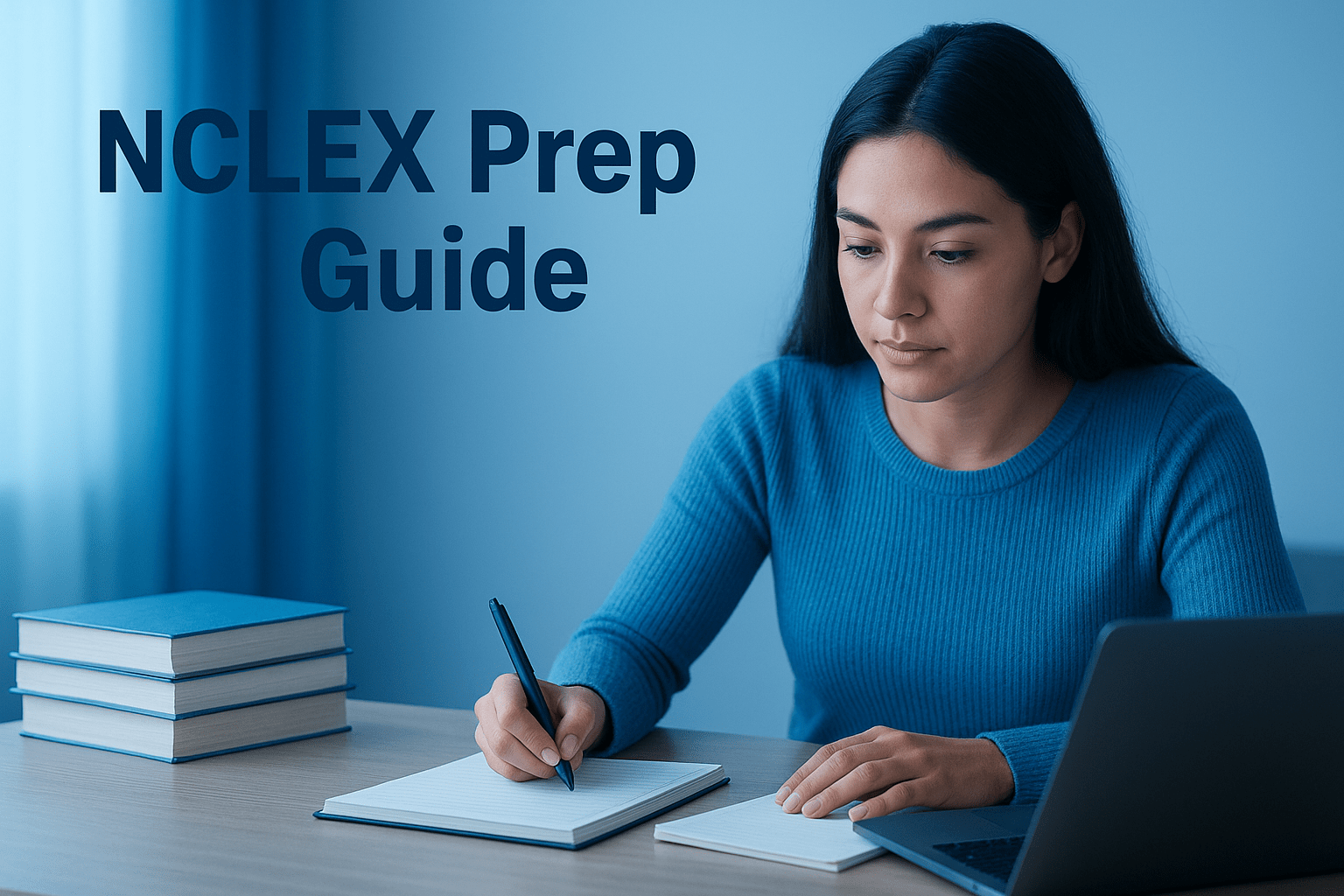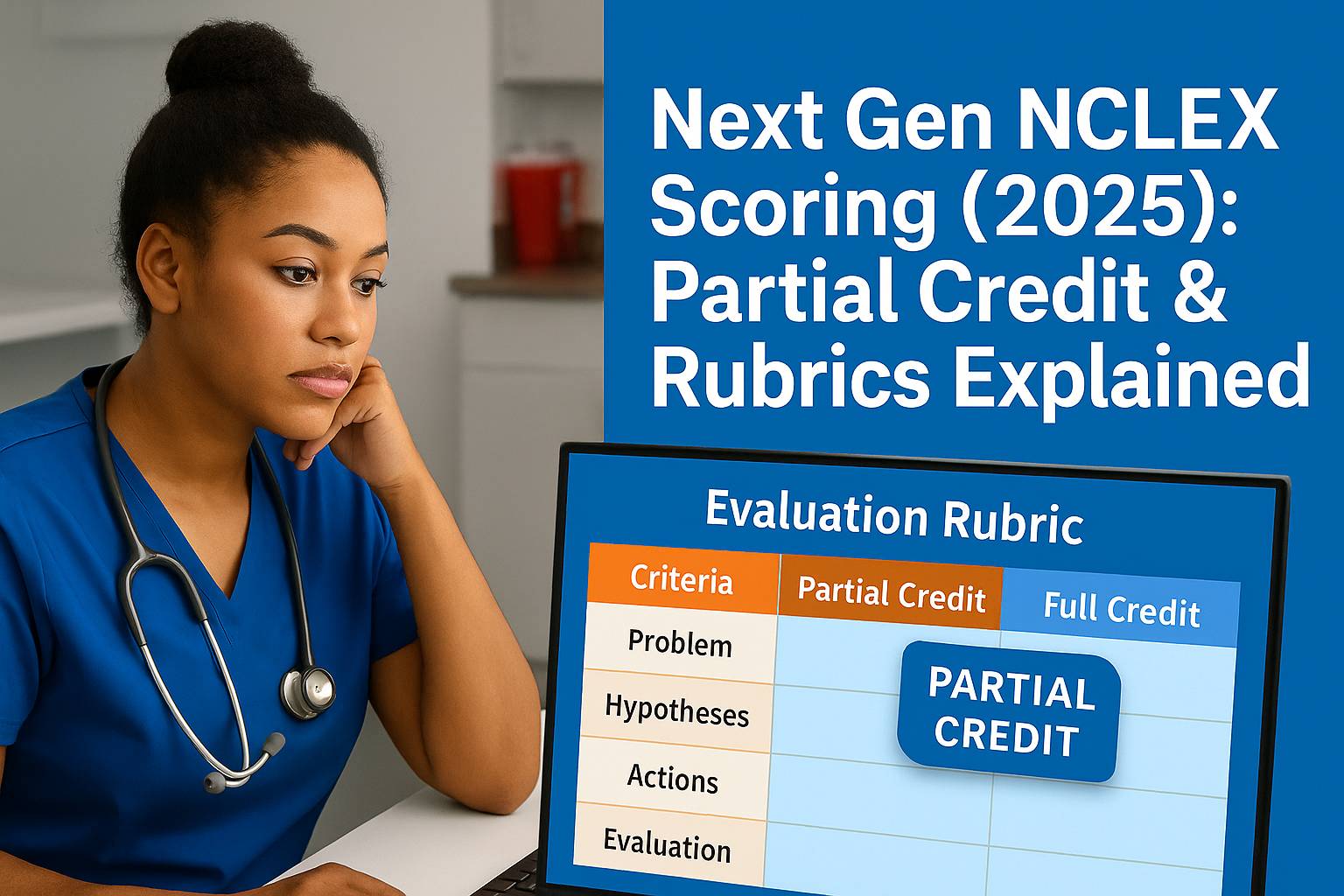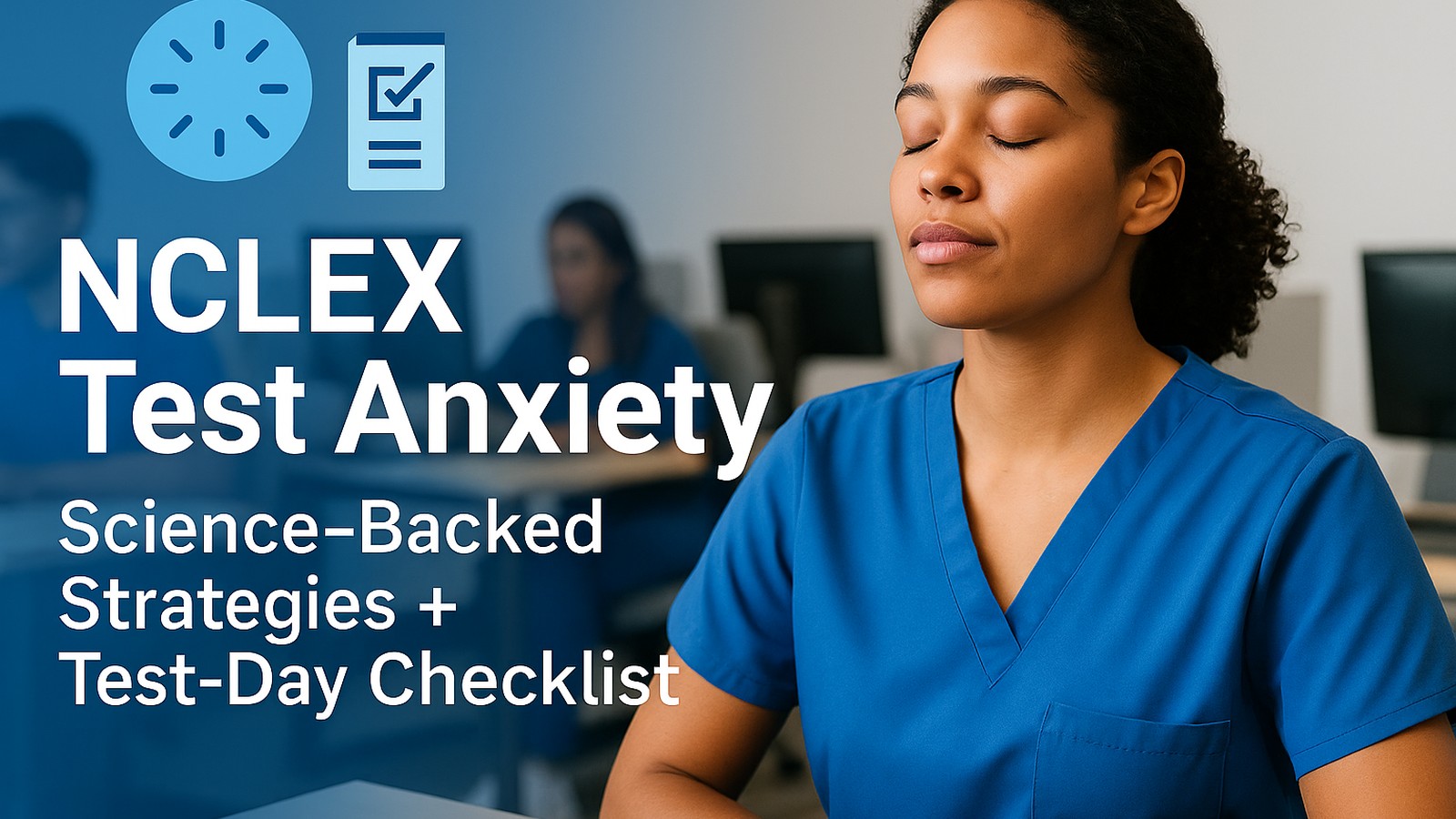Legal and Ethical Nursing NCLEX topics show up on almost every exam. They also guide safe, professional practice. This guide keeps it simple. Short sentences. Plain words. Quick decisions you can use on test day and at the bedside.
We will cover four high-yield areas:
-
Informed consent
-
Delegation
-
Confidentiality (HIPAA)
-
Scope of practice
You will also see quick rules, “do first” steps, and common NCLEX traps. Use this to study fast, remember more, and protect your license.
At Nurseclex, you can practice these with interactive questions and clear rationales. It’s the easiest way to master Legal and Ethical Nursing NCLEX skills.
1) Informed Consent
Scenario
A patient is scheduled for surgery. The doctor explained the procedure earlier. You bring the consent form. The patient looks confused.
Legal and Ethical Nursing NCLEX rule
Consent must be informed, voluntary, and understood.
Your role as the nurse
-
You do not obtain medical consent.
-
You may witness the signature only if the patient understands.
-
If the patient is unsure, stop.
-
Call the provider to re-explain.
-
Encourage questions. Provide calm support.
Do first
-
Assess understanding: “Can you tell me what the surgery will do?”
-
If the answer is unclear, pause the process.
Do not
-
Do not rush or pressure the patient.
-
Do not witness a signature when understanding is doubtful.
NCLEX trap to avoid
“Proceed because the physician already explained it.” Wrong. Patient advocacy comes first.
Practice more
Find consent cases and rationales at NurseClex. These mirror common Legal and Ethical Nursing NCLEX items.
2) Delegation
Scenario
One patient needs vital signs now. Another needs scheduled meds. The unit is busy.
Key idea for Legal and Ethical Nursing NCLEX
Match the task to the right person, in the right situation, with the right directions, and the right follow-up. These are the Five Rights of Delegation.
Five Rights of Delegation
-
Right Task – Routine, predictable, not assessment-heavy.
-
Right Circumstances – Patient is stable. The environment is safe.
-
Right Person – Trained and allowed by role.
-
Right Direction/Communication – Be clear: what, when, how, what to report.
-
Right Supervision/Evaluation – You remain accountable. Check outcomes.
Who does what?
-
RN: assessment, teaching, evaluation, care for unstable or complex patients.
-
LPN/LVN: predictable care for stable patients; some meds and procedures per policy.
-
UAP/NA: routine tasks (vitals on stable patients, hygiene, ambulation).
Do first
-
Decide if the patient is stable or unstable.
-
If unstable or new/acute changes → RN keeps the task.
NCLEX trap to avoid
Delegating assessment, teaching, or evaluation to UAP or LPN. Those are RN duties.
Practice more
Use Nurseclex delegation drills. They target Legal and Ethical Nursing NCLEX decisions you’ll see on exam day.
3) Confidentiality (HIPAA)
Scenario
A coworker talks about a patient during lunch. Others can hear. The patient could be identified.
Legal and Ethical Nursing NCLEX rule
Protect patient information everywhere. Spoken. Written. Electronic.
What to do
-
Ask to speak with your coworker privately.
-
Reinforce privacy rules.
-
If needed, report per policy.
-
Move all patient talks to private, clinical areas.
-
Keep screens locked and papers secure.
Do first
-
Stop the public discussion.
-
Redirect to a private place.
Do not
-
Do not share details in elevators, hallways, or cafeterias.
-
Do not post or message patient info on personal devices or social media.
NCLEX trap to avoid
Thinking “It’s harmless; no names were used.” If details can identify the patient, it is not harmless.
Practice more
Nurseclex has HIPAA scenarios with step-by-step rationales focused on Legal and Ethical Nursing NCLEX logic.
4) Scope of Practice
Scenario
You are asked to perform a procedure that is not in your Nurse Practice Act or in your training.
Legal and Ethical Nursing NCLEX rule
Know your state Nurse Practice Act (NPA). Practice within your scope. Protect patients and your license.
What to do
-
Politely decline the task if it is outside your legal scope or training.
-
Explain the concern and suggest a safe alternative.
-
Notify the charge nurse or manager if needed.
Do first
-
Check policy, NPA, and competency.
-
Ask: Is the patient safe if I do this? Am I allowed and trained?
Do not
-
Do not perform tasks outside scope “just this once.”
-
Do not guess. When unsure, verify.
NCLEX trap to avoid
“Help the team and figure it out later.” Wrong. Safety and legality come first.
Practice more
NurseClex has targeted scope questions and quick charts built for Legal and Ethical Nursing NCLEX mastery.
Rapid Review: First Steps and Short Rules
Use these to break down tough questions fast.
First steps
-
Safety: Is there an immediate risk?
-
Stability: Stable vs. unstable.
-
Role: RN vs. LPN vs. UAP.
-
Legal: NPA, policy, consent status, privacy.
-
Data: Do I need to assess more before I act?
Short rules
-
If understanding is unclear → Stop and advocate for the patient.
-
If the patient is unstable or new/acute → RN keeps the task.
-
If info is identifiable → Protect privacy now.
-
If task is outside scope → Do not do it.
-
When stuck → Re-read the stem. Look for safety words: “first,” “best,” “immediate,” “priority.”
These are the backbone of many Legal and Ethical Nursing NCLEX items.
Mini Practice Prompts
Try these quickly. Say your first action out loud.
-
Consent: Patient says, “I don’t really get this surgery.”
-
First: Pause consent. Call the provider to re-explain.
-
-
Delegation: Stable patient needs repeat vitals.
-
First: Delegate to trained UAP with clear directions; you will review results.
-
-
Confidentiality: Friend asks, “Is my neighbor on your floor?”
-
First: Do not confirm or deny. Protect privacy.
-
-
Scope: You are told to push a med you have not been trained to give IV.
-
First: Do not administer. Notify charge nurse. Find trained personnel.
-
This is the exact thinking Legal and Ethical Nursing NCLEX questions want to see.
Study Plan That Works
Use this simple loop:
-
Learn the rule (short, plain).
-
Apply it to 2–3 scenarios.
-
Check your answers with rationales.
-
Repeat the ones you miss tomorrow.
You can run this loop in 15–20 minutes a day at Nurseclex. Short sets. Clear rationales. Strong recall.
Conclusion: Pass the Test. Protect the Patient. Protect Your License.
Legal and Ethical Nursing NCLEX success comes from clear steps:
-
Informed consent: Advocate first. Stop if understanding is unclear.
-
Delegation: Match task to role. Keep unstable patients with the RN.
-
Confidentiality: Guard patient info everywhere.
-
Scope of practice: Know your NPA. When in doubt, verify or decline.
These rules keep patients safe and your practice strong. Practice them daily. Keep your sentences short in your head. Think “safety, stability, role, legality.” You will answer faster and safer.
For interactive scenarios, quick quizzes, and exam-style rationales focused on Legal and Ethical Nursing NCLEX, visit Nurseclex. Learn it. Practice it. Own it.
Further Reading
Decoding NCLEX Next Gen Item Types: Mastering the Future of Nursing Exams
